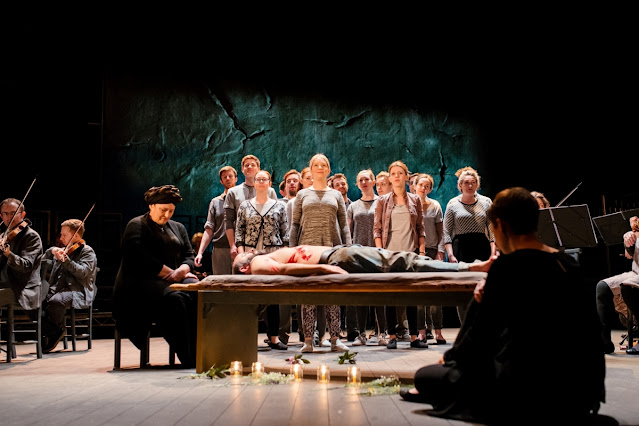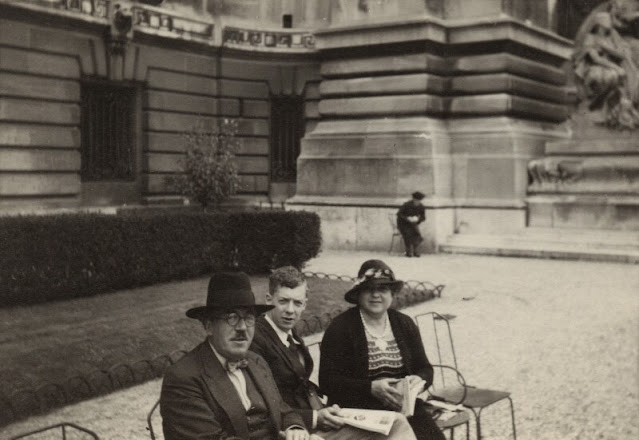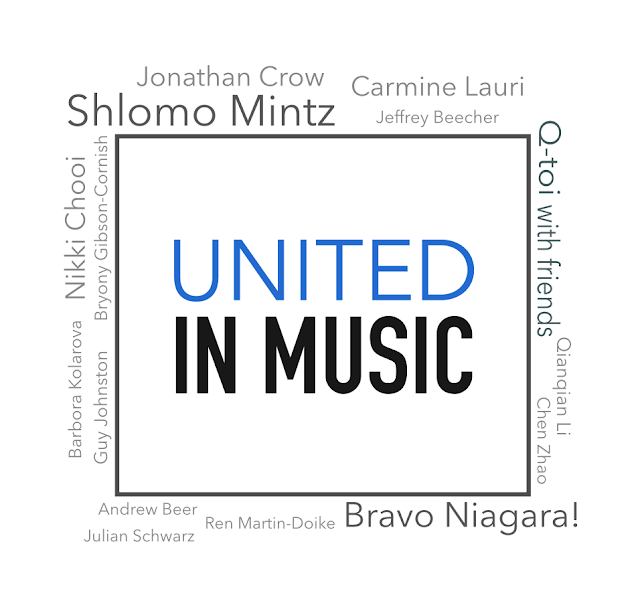 |
| Handel: Messiah - Catherine Wyn-Rogers, Jamie Beddard, The Erebus Ensemble, The English Concert - Bristol Old Vic 2017 (Photo Jack Offord) |
This week our opera viewing had two themes, Handel (in the form of Agrippina and Messiah) and operatic epics (in the form of Rimsky-Korsakov's Sadko and Berlioz' Les Troyens).
Our viewing week started with Handel's Agrippina from The Grange Festival in 2018 [see my review]. Walter Sutcliffe's vividly theatrical production sets the piece in a theatre with Anna Bonitatibus, Raffaele Pe and Christopher Ainslie all scheming to succeed Ashley Riches' theatre director Claudio, with Stefanie True as Poppea (what Winton Dean described as one of Handel's 'sex kitten' roles!). In the theatre, the performance made strong use of the small theatre, and film brought us even closer to the singers. With some great Handel singing and playing; Robert Howarth directing the Academy of Ancient Music. The performance is available for a limited time, with Bernstein's Candide and Mozart's Le nozze di Figaro to come; see the festival's streaming page for details.
We have been continuing our exploration of the operas of Nicolai Rimsky-Korsakov; he wrote 16 in all, containing some of his finest music yet they are woefully unexplored in the West. Flemish Opera produced Rimsky-Korsakov's 1895/96 folk-tale Sadko in 2017, directed by Daniel Kramer and conducted by Dmitri Jurowski, with Zurab Zurabishvili, Betsy Horne, Anatoli Kotscherga, Victoria Yarovaya and Raehann Bryce-Davies. It is a strange, complex tale inspired by a Russian oral epic poem, and as with any folk material there is a lot happening below the surface. Kramer's production brought it into the 20th century, and dropped the Russian background, concentrating on the work's dramatic undercurrents. Not everything worked, but Jurowski drew strong performances from his team, and it whets my appetite for seeing it live. See Opera Ballet Vlaamse's streaming page for details.
On Friday there was another operatic epic, Berlioz' Les Troyens from the Metropolitan Opera. We saw Francesca Zamballo's production in New York when it was new in 2004 (with Deborah Voigt, Michelle DeYoung, Ben Heppner and James Levine). This was the 2013 revival, conducted by Fabio Luisi with Deborah Voight returning as Cassandre, Susan Graham as Didon and Bryan Hymel as Aeneas. Zamballo's production is colourful and traditional, though a bit busy for my taste, and she deals with the work's dramaturgical problems by inventing business for characters. Thankfully the aerial ballet for Dido and Aeneas during the Royal Hunt and Storm had been re-thought since 2004; it is interesting that of all the productions of the opera I have seen, only one, that directed by Richard Jones at English National Opera followed Berlioz' stage directions for the Royal Hunt and Storm!. It was lovely to see Hymel's youthful and vibrant Aeneas again [we first saw him in the role in Amsterdam in 2010, see my review, and again at Covent Garden in 2012, see my review]. He makes character's explosive first entry seem easy, in the right way, and impressed throughout. Deborah Voigt was a dignified Cassandre, her dramatic soprano coping with the role's low tessitura with ease. We saw Susan Graham as Didon in John Eliot Gardiner's performance of Les Troyens at the Chatelet Theatre in Paris in 2003, performances notable for the musical rather than dramatic values (there is a DVD recording capturing the vivid historically informed performance), and here ten years later she was profoundly dignified and very, very moving, very much in the Janet Baker mould.
Finally, we returned to Handel for a staging which isn't strictly an opera. It has become common to stage Handel's oratorios, but I had always shied away from the idea of staging Messiah. But there have been successful stagings of Bach's Passions, so why not Messiah and for its librettist Charles Jennens, the piece explicitly told a story even though there were no named characters, and much of the work was done by the chorus. Bristol Old Vic has put its 2017 staging of Handel's Messiah on its streaming platform, available until 5 June 2020, and it is well worth catching. Tom Morris' production is small scale and intimate, using the Erebus Ensemble and the English Concert, directed by Harry Bicket with soloists Julia Doyle, Catherine Wyn Rogers, Joshua Ellicott, Brindley Sherratt and Henry Ashbee (treble). The action starts with the disciples around the body of the Beloved (actor Jamie Beddard), gathered to mourn and then to tell the story, circling back round to the opening again but after a profound communal experience. Not everything worked (the film rather glossed over Beddard's washing of audience member's feet), but having everything off the book, in a small space, creating a tautly dramatic and very vivid performance. This was completely engrossing in a way that concert performances rarely are. And this was very much a communal performance, if soloists on stage during the choruses sang them as well. Full details from the Bristol Old Vic website.
I have always loved Fascinating Aida, in fact appeared on the same bill as them back in the 1980s when directing the Pink Singers! Dillie Keane had her own wonderful take on the present crisis [YouTube]
Conductor John Andrews is one of those people whose work I always enjoy, whether it be conducting a rare Arne opera or excavating unfairly neglected late 19th century English opera. Whilst in lockdown he has been producting his Brief History of Opera; well worth a look [YouTube]. Since April, pianist Anyssa Neumann has been working her way through Bach's Goldberg Variations, every few days performing one from memory, and talking about it before-hand. She has a complete playlist on YouTube. Another pianist, Nafis Umerkulova has been encouraging us to explore rather rarer repertoire, and she has created a video the Russian composer Alexei Stanchinsky and his Three Preludes [YouTube]
Composer Alex Groves was intended to have Curved Form (St Endellion) performed as a commission by the Manchester Collective. As this has not been able to happen yet, he has released it in electronic form. He describes is thus - 'Created whilst on a residency in St Endellion and inspired by the vivid colours of the Cornish coastline, the piece occupies a single harmonic world - an unchanging vista - in which the features remain the same but their appearance is constantly changing.' [BandCamp]. Thomas Foster's Unheard: Unseen project challenged composers to work together collaboratively and anonymously on new pieces of music. The resulting three pieces were streamed, performed by Sarah Parkes Bowen, Gavin Roberts and the Locus Ensemble, featuring 14 different composers [Facebook]
English Touring Opera's sequence of videos continue, and I was rather struct by one where two members of The Old Street Band discussed gut strings, central to the sound-world of period string performance and fascinating to learn more [YouTube]. And the percussion section of the orchestra of the Royal Opera House had intriguing solutions to the problem of how to perform the descent into Nibelheim from Wagner's Das Rheingold under lockdown with no access to all those anvils! [Twitter]. And Nicol Edmonds, a soloist with the Royal Ballet, impressed with his amazing sense of balance, even under lock down; we rather take this for granted in dancers, being seeing him do it in his back garden rather brings it home. [Instagram]
Finally more long distance lieder, pianist Roger Vignoles and soprano Louise Alder in Richard Strauss' Morgen [YouTube] The song itself is fascinating as, though it is commonly sung by a woman, the text was written by a man about a man (thought at the time he set it, we don't think that Richard Strauss knew this), and Strauss' own recorded performances of the song are with a male soloist [see my article Richard Strauss and the gay sensibility]






















.jpg)



.jpg)




